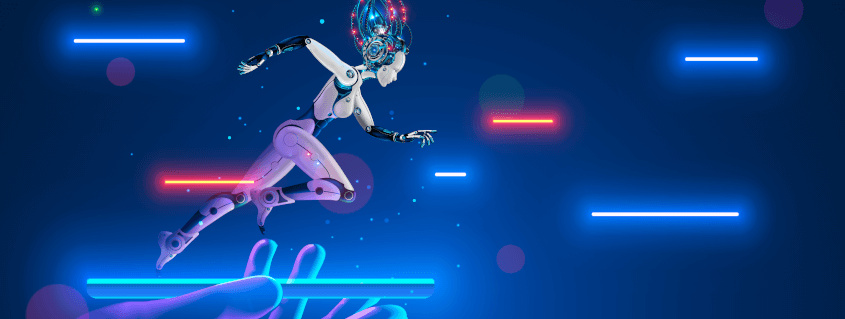Artificial Intelligence is a rapidly growing sector within technology that is expected to grow by as much as 42% up to the year 2027. The foundation of AI is machine learning with its algorithms that mimic and sometimes improve upon the human brain’s ability to adapt and learn. The current limitations of machine learning are a combination of speed and volume of information that can be processed and used in a meaningful way. According to the AI index report, computational power in the AI industry has been doubling approximately every 3.4 months. At this rate, the limitations of AI are evaporating quickly, making the future potential of the technology mindboggling.
THE WORLD OF NOW
Robotic Process Automation (RPA) is reducing the drudgery of repetitive rule-based business processes that have until now, been conducted by human employees. This has also reduced the costs involved with compliance and improved efficiency dramatically. The applications of RPA are broad and it is finding its way into finance, HR, and manufacturing.
AI is continuing to improve the ability of automated chatbots to understand and communicate with people. In any area of service, bots can interact with a human, understand their voices, adapt to accent, and learn from the human’s preferences. These types of bots are already available to online shoppers and in the coming years will be prevalent in all customer service applications.
Banks are already utilising AI to detect fraud and suspicious activity in customer’s cheque accounts and credit cards. Similar software is employed to monitor and protect the integrity of large databases of information. AI’s ability to detect phishing and hacking activity is improving by the year.
Computerised business forecasting and analysis is starting to rival human ability in many ways. AI has paved the way for computers to better understand abstract concepts such as context, reasoning, and interpretation. When this is combined with the ability to rapidly process large data quantities, human decision-making is taken to a new level.
THE WORLD OF TOMORROW
Scientist Eric Topol believes that the greatest impact that AI will have on the field of medicine in the near future, will be to greatly reduce the misdiagnoses of illness. In addition, AI in our cell phones will enable the average person to manage their own health to a large extent. Symptoms of diseases that are often overlooked until it is too late will be readily identified by apps on our own phones. Magnetic Resonance Imaging (MRI) is going to become faster and more efficient with capturing moving internal organs such as the heart and lungs.
Education will be transformed by AI mentors that can assist students with their homework and adapt to individual learning speeds. Papers and assignments will be graded in minutes. This potential in education is far-reaching as it can also improve the quality of education and support offered to students in poor communities, raising the overall standard of education.
WONDER AND FEAR
The possibilities of AI are astounding. It brings a sense of awe as well as concern. Like with most technologies, it can change the world for good, bad, or both. As AI becomes to dominate more and more areas of the human world, the need for privacy and intelligent legislation, both domestic and international, will be crucial. We, humans, are very clever indeed but we need to work on wisdom.
“Trend in artificial intelligence” by Alan Jones.

